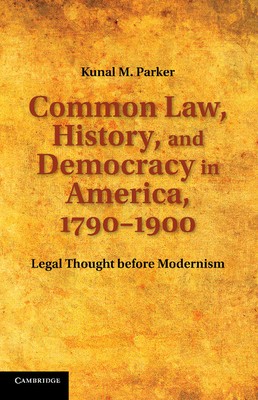
- We will send in 10–14 business days.
- Author: Kunal M Parker
- Publisher: Cambridge University Press
- Year: 2013
- ISBN-10: 110761435X
- ISBN-13: 9781107614352
- Format: 15.2 x 22.9 x 1.8 cm, softcover
- Language: English
- SAVE -10% with code: EXTRA
Common Law, History, and Democracy in America, 1790-1900 (e-book) (used book) | bookbook.eu
Reviews
Description
This book argues for a change in our understanding of the relationships among law, politics, and history. Since the turn of the nineteenth century, a certain anti-foundational conception of history has served to undermine law's foundations, such that we tend to think of law as nothing other than a species of politics. Thus viewed, the activity of unelected, common law judges appears to be an encroachment on the space of democracy. However, Kunal M. Parker shows that the world of the nineteenth century looked rather different. Democracy was itself constrained by a sense that history possessed a logic, meaning, and direction that democracy could not contravene. In such a world, far from law being seen in opposition to democracy, it was possible to argue that law - specifically, the common law - did a better job than democracy of guiding America along history's path.
EXTRA 10 % discount with code: EXTRA
The promotion ends in 19d.11:08:24
The discount code is valid when purchasing from 10 €. Discounts do not stack.
- Author: Kunal M Parker
- Publisher: Cambridge University Press
- Year: 2013
- ISBN-10: 110761435X
- ISBN-13: 9781107614352
- Format: 15.2 x 22.9 x 1.8 cm, softcover
- Language: English English
This book argues for a change in our understanding of the relationships among law, politics, and history. Since the turn of the nineteenth century, a certain anti-foundational conception of history has served to undermine law's foundations, such that we tend to think of law as nothing other than a species of politics. Thus viewed, the activity of unelected, common law judges appears to be an encroachment on the space of democracy. However, Kunal M. Parker shows that the world of the nineteenth century looked rather different. Democracy was itself constrained by a sense that history possessed a logic, meaning, and direction that democracy could not contravene. In such a world, far from law being seen in opposition to democracy, it was possible to argue that law - specifically, the common law - did a better job than democracy of guiding America along history's path.


Reviews